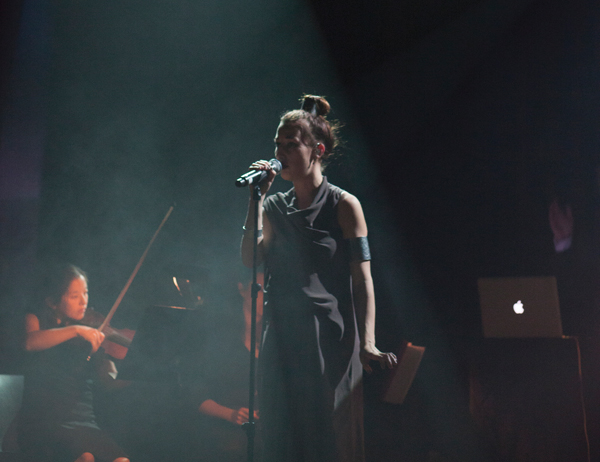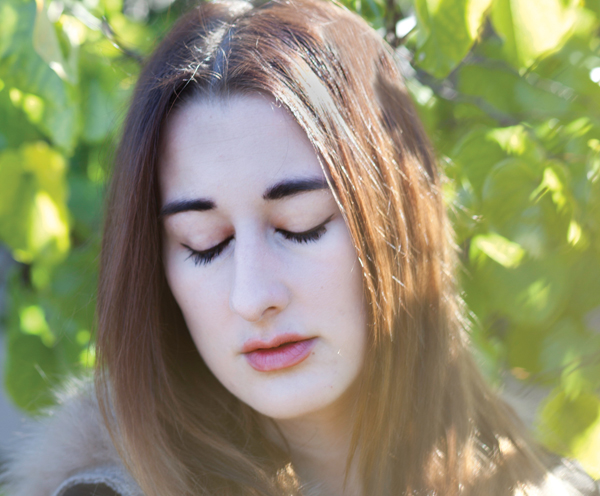It’s a brisk autumn day in Asheville, North Carolina, but that doesn’t bother Nika Roza Danilova, aka Zola Jesus. She’s here to perform at the Mountain Oasis Electronic Music Summit, the last show of her tour with JG Thirlwell and the Mivos Quartet in support of her latest album. That album was inspired by a gig and has in turn inspired her to write with more fervor than ever before. She is darkly philosophical and avoids uniformity at all costs, only 24-years-old but with more drive than artists twice her age. To outsiders it may seem that she has come a long way since her 2009 debut, but for anyone who has kept close tabs on Zola Jesus, it’s clear this is only the beginning.
Growing up in the deep woods of Wisconsin leaves you no stranger to low temperatures and long periods with little human contact. She spent her formative years surrounded by trees, a wide-open sky and whatever music she could get her hands on. She loved all kinds but it was the powerful voices in opera that drew her in and inspired her to begin singing on her own. More at ease in isolation than in company, she felt music would help her interact with others more easily. Her teenage years were spent in lessons as she tried to force her voice to become like those of the great operatic singers until, one day, she realized that it wasn’t going to make her happy. “Then I began to try to unlearn it all,” she says of her years just before going to college, trying to find a place in her voice where she felt confident and comfortable.
Zola Jesus recorded her first album, The Spoils, in her dorm room at the University of Wisconsin-Madison, writing and producing between classes. The Spoils was industrial melancholia pop that ran counter to most everything coming out at the time. The sounds were abrasive, the harmonies often discordant, with Zola’s powerful voice coming through buried in reverb and delay. The record garnered Internet buzz in a music community looking for a new sound, and Zola left college to begin touring. She was going to chase her dream, but it would bring with it a host of obstacles.
Zola spent many years writing, practicing, and producing alone. Time spent holed up from the Wisconsin winters isolated her from whatever trend came and went as she explored her own ideas. “You create in your own world,” she says of the process, “there is so much freedom, the creation is more instinctive.” Despite recently moving to L.A. where winter never comes, she still writes and produces her music alone, admitting she finds the collaborative process challenging. The first time she worked with other musicians was for her first tour, recruiting a bassist, drummer, and synth player to help perform her songs live. “It’s a steep learning curve, reconciling their ideas with what you want. You have to develop a kind of internal language.” It was a difficult process, but for Zola “challenges are opportunities to grow.” It was well worth it; her tours have drawn crowds and praise across the country.
In the five years since The Spoils Zola Jesus has released two albums and provided guest vocals for artists such as M83, Prefuse 73, and Orbital. The years have shown her grow as a writer and producer, embracing more organic sounds that have, in combination with her incredible voice, added a classical edge to her reverb-laden industrial-pop creations. Through it all she has been steadfast in her resolution to keep complete control over her art, writing in seclusion and avoiding the confines of a traditional recording studio until this year. This trepidation to collaborate makes her fourth album, Versions, all that more impressive. Grandiose in ambition and beautifully intimate, it marks a turning point in her career.
Versions began as a one-off, a gig at the Guggenheim that she wanted to do something special for. “I wanted to take advantage of the acoustics,” she says, “I’ve always wanted to use strings but could never afford them.” To make this dream come to life she asked avant-garde composer JG Thirlwell (aka Foetus) to arrange selections from her first three albums for string quartet and electronic percussion. This required a huge leap of faith. She was on tour while he arranged the music and they had little interaction, a tortuous time for someone who usually has absolute control over her sound. “I don’t like people touching my music, but I felt JG Thirlwell shouldn’t be inhibited. It was hard but I committed myself.”
The show at the Guggenheim turned out to be equal parts success and inspiration. Pitchfork filmed the concert and the crowd packing the museum’s spirals to hear this young artist’s new sound. Zola herself was so taken in that she asked Thirlwell and the quartet to come record her next album and accompany her on tour.
Versions is not a retrospective, but an introspective moment as she pushes towards new frontiers: a complete reintroduction to Zola Jesus. Despite having no new songs, it feels fresh and inspired. The recontextualization of her material brings out emotions that were previously drowned out. We no longer hear her crying out from an unknown beyond, she’s close and intimate. The songs become less about existential angst and take on loving, painful qualities.
Versions opener “Avalanche” is a perfect example. Originally on 2011’s Conatus, the old “Avalanche” has Zola at a distance, caught somewhere between the synthesized string parts and quantized IDM drum beats that flitter around her. It is emotional but disconnected, as if the artist will only allow her pain to be viewed from afar. In contrast, the new “Avalanche” puts her at the ear’s edge, as if she’s disclosing her secrets and struggles to a close friend or lover. The strings swell organically and rest comfortably behind, allowing her to sing passionately but softly and bring out warm tones in her voice that aren’t present in her trademark belt. It is the sound of an artist finding courage to match the strength of her voice, letting down her guard and overcoming her fears. The sound of a woman taking control of who she is becoming as an artist.
The next album is in the works and will be her most ambitious yet, combining all she’s learned so far with the drive to push her art forward. Versions showed her how much there is to explore within the material she’s already written, how many different angles can be developed from the same source. Now she’s taking the time to be her own collaborator. “I’m writing ten different versions of every song for this album” she says, “I want to do some exploration beforehand.”
Nika Roza Danilova was afraid of a lot of things when she was young, and so she started writing and performing music. It began as a way to combat her anxiety and overcome her fears. Over the past five years she’s channeled these struggles into a unique artistic voice with a remarkably original approach to music. She is woman who refuses to conform, even to herself. Though her voice will always remain the recognizable centerpiece of her music, the rest will change drastically over time. No one can ever predict what will come next from Zola Jesus.
photos by Sarah Jacobs


